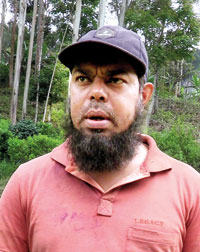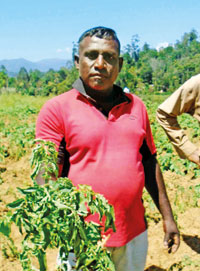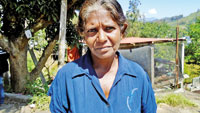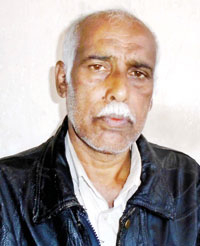News
Farmers pay heavy price in cash losses and low yields due to dodgy private seed imports
View(s):- Low-quality vegetables and fluctuating prices are closely linked to seeds and fertiliser, farmers say
By Dilushi Wijesinghe and K R Rajamanthree
Decades ago, the Department of Agriculture played a key role in the production of seeds, but now it is in the hands of the private sector.

Mohamed Srinath: Suffered losses due to low quality fertiliser
“The private sector has been importing seeds since 1980. For the past two years, it has been an unfortunate situation where quality, which is the most important input of the seeds, fertiliser and pesticides, is being questioned by people,” said Buddhi Marambe, professor of crop science at the University of Peradeniya.
He said that after pesticide imports were banned, products had entered the market even without a label printed in Sinhala. “They were mostly printed in Hindi and most likely to have been brought from South India,” he said.
Agrochemical imports were banned by the ousted president, Gotabaya Rajapaksa, in 2021, and the crop yield halved. The ban was revoked later.
Mohamed Srinath, a farmer in Gurutalawa, Galagoda, is among many who have suffered substantial losses due to low-quality agricultural inputs.
Mr Srinath said he spent Rs 102,000 for carrot seeds and an additional Rs 70,000 to buy 750 kilos of chemical fertiliser from an agent of a private fertiliser company. “Usually, the crop absorbs chemical fertiliser within 2-3 days, but this time, the fertiliser remained on the surface,” he said.
He found that the fertiliser had been adulterated with sand.
“We took the remaining fertiliser and washed it with water, and found that sand had been mixed with fertiliser,” he said. “No one takes responsibility for our loss caused by the rain and substandard seed. And the burden of skyrocketing prices is being borne by consumers.’’
Mr Srinath also bought two packets of tomato seeds and planted them in two nurseries. “The seeds in one packet produced a 90% harvest as usual, but the second packet did not produce any crop at all,” he said. “I checked the packaging of both seeds, as this was rather unusual. Although both packages had the same name, lettering, and design, the packaging on the seeds, which did not produce crops, had a lighter colour.”
He suspects that farmers are being cheated.

Farmer Amith Karunaratne: Low-Qaulity products due to substandard seeds
A senior official of the National Fertiliser Secretariat (NFS) told the Sunday Times that although there is competition between private companies, the secretariat is not responsible for the product and does not have the capacity to take legal action against the private sector.
The official said fertiliser is tested in five labs across the country and there is no possibility of the quality being below standard unless the competition among companies may lead to sabotage. He said regulations are followed as the samples that are tested are secured under a coded system.

B D Premawathi: Filed police case
Prof Marambe said the illegal entry has messed up the situation as people can earn a quick buck, but in the long run, it is not going to do any good to the situation in Sri Lanka. “The Sri Lanka Standards Institution (SLSI) sets quality standards, and accredited laboratories check whether the samples or products adhere to them. The private sector should make sure that they take responsibility for quality.’’
Farmers said substandard seeds made them vulnerable.
J B Rathnayake, an Uvaparanagama cultivator, said that substandard seeds, and natural and chemical fertiliser are sold at high prices. “I recently bought capsicum seeds from a reputable organisation. My harvest turned out to be substandard produce of various sizes, and selling it to the market was a major challenge,” Mr Rathnayake said.
B D Premawathi, a farmer in Nadungamuwa, said: “I bought 500 kilos of imported seed potatoes for Rs 35,000, from the Welimada town in December last year. The seed potatoes were imported by a multinational company that imports vegetable seeds, chemical fertiliser and pesticides. Now, the crop is 45 days old, and it is slowly decaying.’’ She said she had filed a police complaint against the agent and the company on January 5.
A representative of the company had arrived at the police station and said that he and a few more officials would visit to inspect the crop. “The area manager of the company said that they would inform the main organisation and do us justice,” Ms Premawathi said. The representative had visited on February 7, and informed Ms Premawathi that officials in Colombo would soon be notified.

Karunaratne: Suffering in silence
The Sunday Times contacted the multinational company’s consultant for seed potatoes. He said seeds are imported from the Netherlands, France, and Germany.
All imported seeds go through the mandatory quarantine process at the National Plant Quarantine Service (NPQS).
“When importing, it is stored in cool containers at 12 degrees Celsius,” he said. “On the completion of the quarantine period, samples are sent to the lab, and the rest is stored until the reports are available. If the lab report is positive, we sell it, if not, we destroy it.
“We train the farmers on how to select the good seeds, but they do not follow through. The success of the current potato crop is very important for Welimada farmers, and therefore crop damage during this season is a double hit for the farmers,” the consultant said. “The Government should help the farmers to improve their land conditions to improve drainage and minimise soil erosion.’’
The consultant also said that the same seeds were sent to Nuwara Eliya, but there were no complaints. Officials of the company had visited the research centre and farmers in Welimada and had collected samples for lab tests.
The consultant said that the detection of two types of bacteria (Pectobacterium and Ralstonia solanacearum) in the soil was a key finding.
“Land preparation is not being done correctly. Land preparation starts with the first ploughing, which is the turning of the soil. This is not being done,” the consultant said. “We have the first, second and third plough. They do only one, which is not enough. You must create a balance between the beneficial and the harmful.’’
Prof Marambe said: “There are different techniques that people adopt at different levels. Farmers have their own way of handling materials. The blame should not go to one single entity as it is based on the practices that we use, and the private sector should also make sure that they are responsible for quality. However, the job of the farming community is to make sure the recommendations are adhered to.’’
Prof Marambe said that a quality control mechanism should be adopted at the ground level. “I feel it is high time that organised random checks be done with the material that has been imported and marketed in Sri Lanka.’’
He said the new national agriculture policy on food and feed crops, which is still with the Cabinet, addresses the issues. “We have to get it approved quickly and implement it.”
H M Karunarathne, a farmer leader in Keppetipola, said that although the media presents the injustices to farmers, they appear to be suffering in silence as only a few farmers speak up for all of them, and the scams go unnoticed.
Meanwhile, a fraud related to urea was reported where farmers were cheated of over Rs 10 million by five mainstream companies. The companies had imported a pack of soil for Rs 2,500, which was required to be sold at Rs 1,100 under the fertiliser relief programme but they sold the pack for Rs 3,500. Those responsible have not been arrested.
| Pricey seed importers exploit outdated regulations Sri Lanka imports a heavy volume of seed for vegetable farming at a steep cost, which is estimated to be as much as Rs 2 billion on average every year. Some seeds are as expensive as small-scale agri tools. This month’s data show, for example, a kilo of alu puhul, or ash gourd, seed costs Rs 32,500. Bitter gourd (karawila) Thinnaweli White variety costs Rs 35,000 a kilo. Some seeds imported by the private sector are not certified according to international standards because they are voluntary. Even the Plant Protection Act (No. 35 of 1999), does not help farmers, although it mandates seed imports that are standardised. And the Seed Act No. 22 of 2003, which aims to regulate seed quality, among other issues, is heavily outdated, and does not protect vegetable growers from private sector seed importer fraud. Besides, Sri Lanka’s farmers have no mechanism to seek financial compensation if they find themselves cheated by private companies that peddle substandard seed. Researchers have found that seeds are imported for 90% of the upcountry vegetable cultivation, including beet, leeks, carrot, tomato, capsicum, and pumpkin. As for low-country vegetables, including red onion, luffa, cucumber, brinjal, pumpkin, bitter gourd, and snake gourd, more than a third of the seeds needed every year are imported. Seed prices also fluctuate seasonally. Seed certification in Sri Lanka, to ensure factors such as seed health and purity of the varieties, is a handicapped process without enough funding from successive governments. Certification is not required and is voluntary.-KB
| |
The best way to say that you found the home of your dreams is by finding it on Hitad.lk. We have listings for apartments for sale or rent in Sri Lanka, no matter what locale you're looking for! Whether you live in Colombo, Galle, Kandy, Matara, Jaffna and more - we've got them all!

